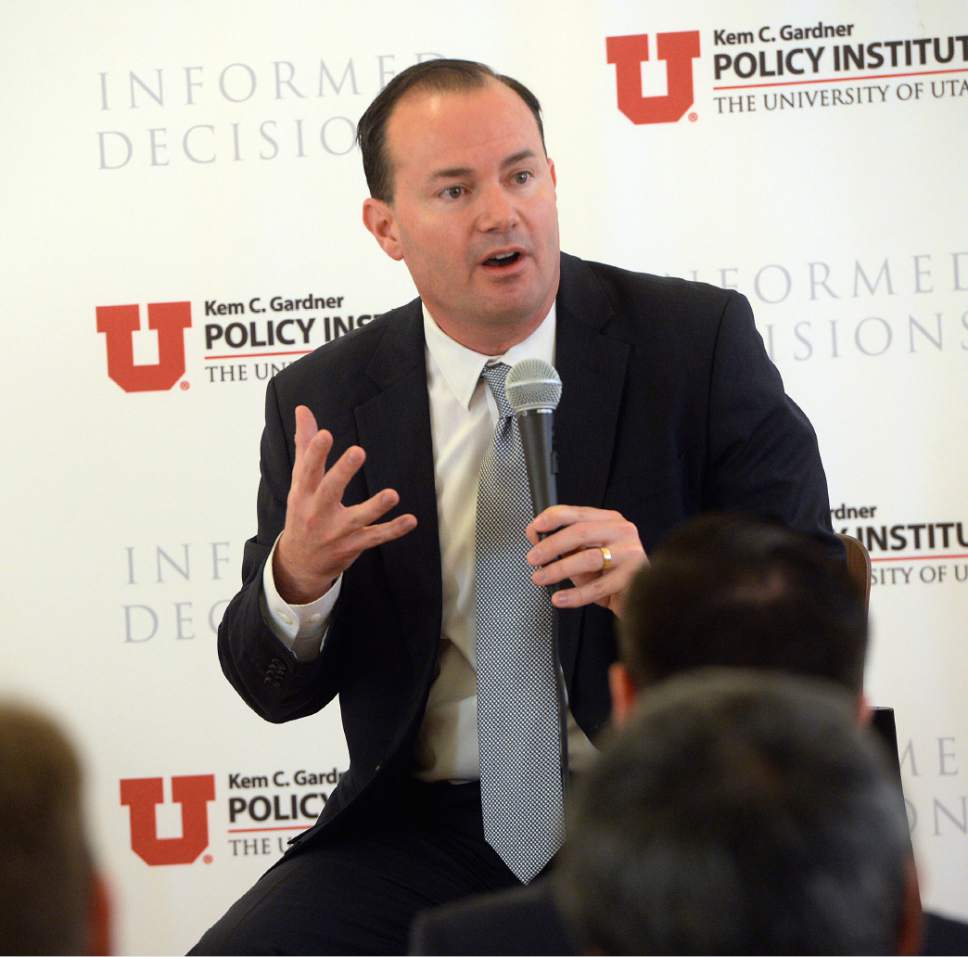This is an archived article that was published on sltrib.com in 2017, and information in the article may be outdated. It is provided only for personal research purposes and may not be reprinted.
As Republicans coalesce around a plan that dumps the requirement to buy insurance but keeps some popular parts of Obamacare, a small faction within the party could disrupt and ultimately kill the long-promised health care overhaul.
Among those standing in opposition? Utah's Mike Lee. The senator sees his party's plan as too similar to Obamacare and slams it as a rushed and ineffective compromise forged without public input. With a slim Republican majority in the Senate and assured pushback from Democrats, Lee's vote could be key.
"This is not the Obamacare repeal bill we've been waiting for," Lee said. "It is a missed opportunity and a step in the wrong direction."
He is joined by Sen. Rand Paul, R-Ky., and a band of conservative House members in his disapproval for the package introduced Monday that's meant to fulfill persistent calls by Republicans to "repeal and replace" former President Barack Obama's signature health plan passed in 2010, officially titled the Affordable Care Act.
One more conservative senator aligned against it could spell its demise. Sen. Ted Cruz, R-Texas, has already signaled his skepticism.
These far-right lawmakers have dubbed the plan "Obamacare-lite" and seek a straight-forward repeal of the Affordable Care Act, before talking about what comes next.
They believe if they start from scratch, they can draft a more conservative health care plan rather than trying to negotiate around current Obamacare policies.
"We are united in repeal," Paul said.
Utah's other senator supports the party's plan.
Sen. Orrin Hatch, who as chairman of the Finance Committee will be instrumental in moving the legislation through the Senate, sees the proposal as a "positive step in the right direction." He asks "my colleagues to refrain from final judgments" and suggests that they'll have a chance to amend it.
"Even in its early stages, this bill represents a significant improvement over Obamacare," he said in prepared remarks.
President Donald Trump is on board with the GOP revisions, something party leaders expect to boost support for the plan.
"Obamacare is collapsing," Trump told reporters. "It's in bad shape, and we're going to take action. There's going to be no slowing down, there's going to be no waiting and no more excuses by anybody."
He added: "It's a complicated process but actually it's very simple, it's called good health care."
Though Trump had once promised "insurance for everybody," the new plan is expected to cover fewer people. It removes the fine for not having coverage, making it less likely that those who are healthy or who cannot afford a plan will sign up. That may raise premium costs, particularly for older individuals. It also phases out an expansion of Medicaid.
Two House committees are expected to vote on the bill this week — possibly as early as Wednesday — and congressional leaders say they want it passed before their standard April break.
The plan retains several provisions from Obamacare, including a requirement that insurance companies cover people with preexisting conditions. It also continues to allow parents to keep their children on their plan until age 26.
The Republican plan slashes subsidies that low-income individuals use to pay for insurance in favor of age-based refundable tax credits. Instead of charging a tax fine for not having insurance, the proposal would allow carriers to add a 30 percent premium surcharge for those who drop coverage for a few months and later look to re-enter the market. Additionally, the legislation blocks federal payment for one year to Planned Parenthood.
Lee disagrees with several of the new policies and he also takes issue with how the bill was negotiated in private. He prefers to develop a replacement with more time, leading to more information, such as an estimated economic impact.
"We don't know how many people would use this new tax credit, we don't know how much it will cost and we don't know if this bill will make health care more affordable for Americans," he said. "This is exactly the type of back-room dealing and rushed process that we criticized Democrats for, and it is not what we promised the American people."
Utah's House members, all Republicans, were less inclined to comment on the legislation. Reps. Mia Love, Jason Chaffetz and Rob Bishop did not return requests for comment.
Acknowledging the American Health Care Act "isn't perfect," Rep. Chris Stewart says "it does have merit."
"We will work to improve the bill to further drive down costs, give families more choices and get rid of Washington's one-size-fits-all health care plan," he added in an emailed statement.
Utah Gov. Gary Herbert warned that any infighting threatens to upend meaningful collaboration.
"I expect the Republican side of the aisle will find ways to compromise and hopefully bring some Democrats along with them. The biggest problem with the Affordable Care Act was it was so partisan in its inception," he told reporters Tuesday. "Frankly, if the Democrats and the Republicans don't come together, a pox on both their houses because people are suffering."
The Republican governor did not offer a stance on the plan — saying "it's a little premature" — other than that he looks forward to more state participation and flexibility in health care coverage.
Twitter: @CourtneyLTanner
— Tribune reporter Lee Davidson contributed to this article



